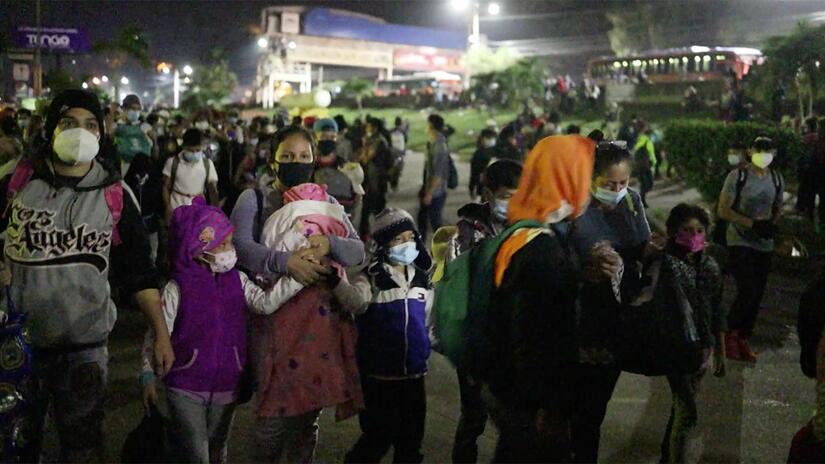Panama/Geneva, 15 January 2021 – The Red Cross is preparing to provide humanitarian assistance to migrants ready to depart Honduras for Guatemala as part of a 'migrant caravan'. More than 4,000 thousand people are expected to join the caravan that will depart from the Honduran city of San Pedro Sula today at 5:00 am local time.
The Honduran Red Cross will support up to 6,000 migrants departing from the northern and southern zones of the country. Humanitarian Service Points will be enabled at the point of departure in the city centre of San Pedro Sula, as well as along the migration route. These spaces will provide access to essential services, such as water, face masks, pre-hospital care, information about safety, security and COVID-19 prevention, as well as means of communication for migrants to keep in touch with their families.
During their journey, people are exposed to dehydration, injuries, and fainting. Often, they also lose contact with family members. Providing support and protection is a humanitarian imperative, especially to vulnerable migrants, such as children, youth, women, indigenous populations, elderly, disable, and LGBTQI people.
At the Guatemalan side of the border, ten Humanitarian Service Points are currently being set up along the border and the migration route. Red Cross volunteers specially trained to work in this context are ready to provide protection and holistic humanitarian assistance to 4,000 people, including psychosocial support, higyene kits, clean water, and information on self-care and COVID-19 prevention.
Martha Keays, Regional Director for the Americas at the International Federation of Red Cross and Red Crescent Societies (IFRC), said: “The potential exclusion of migrants from the COVID-19 prevention plans is concerning. It is our duty, as the world’s largest humanitarian network, to ensure that they are not forgotten. The authorities in the places of origin, transit and destination, as well as international organisations, civil society and the migrants themselves should work hand in hand to ensure that no one is left behind.”
Migrants have been disproportionately affected by the impact of COVID-19. Many of them have been unable to comply with the preventative measures necessary to keep them healthy and safe during the COVID-19 outbreak, due to limited access to essential services – such as health, water, sanitation and hygiene - as well as poor and unsafe living and working conditions. They have also been hit the hardest by the economic fallout of the pandemic.
The combination of COVID-19, social exclusion, discrimination, violence, and climate-related disasters happening at the same time, with a magnitude rarely seen before in Central America, poses new humanitarian challenges. Eta and Iota have destroyed livelihoods across a region that was already facing an economic crisis and where the income of thousands of families had already been severely depleted due to the pandemic. People are at risk of resorting to coping strategies such as selling their animals and properties, eating less food, and abandoning their hometowns to look for new ways of generating income.
Press release
IFRC and SOS MEDITERRANEE urgently call for a closer port of safety for survivors of Mediterranean tragedies
IFRC and SOS MEDITERRANEE urgently call for a closer port of safety for survivors of Mediterranean tragedies
| Press release

